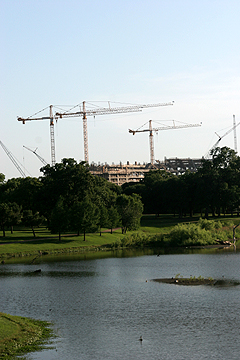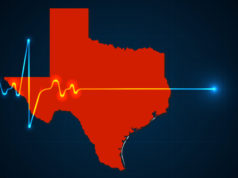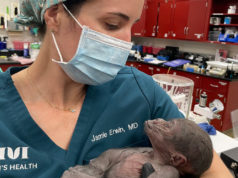 The NFL did that when Arlington voters were deciding in 2004 to give Dallas Cowboys owner Jerry Jones $325 million in sales taxes to build his state-of-the-art stadium. And the NFL has kept its promise. The biggest sporting event in the country, Super Bowl XLV, will be played in Arlington on Feb. 6, 2011. But whether the NFL can make good on its promise of infusing lots of money from this mega-event into the local economy is another matter. Economists who study the economic development estimates trotted out by the NFL and Super Bowl host cities are finding out that the real numbers are routinely a fraction of what was promised. “Super Bowls do have economic impact, because you do have people coming from out of town and staying in hotels and spending in the local economy,” said Victor Matheson, an economics professor at the College of the Holy Cross in Massachusetts. “But our general rule of thumb is that it is about one-tenth of what they tell you.” And for this Super Bowl, it is likely that the city of Arlington will gain very little, mainly because Arlington has no defined downtown or entertainment district.
The NFL did that when Arlington voters were deciding in 2004 to give Dallas Cowboys owner Jerry Jones $325 million in sales taxes to build his state-of-the-art stadium. And the NFL has kept its promise. The biggest sporting event in the country, Super Bowl XLV, will be played in Arlington on Feb. 6, 2011. But whether the NFL can make good on its promise of infusing lots of money from this mega-event into the local economy is another matter. Economists who study the economic development estimates trotted out by the NFL and Super Bowl host cities are finding out that the real numbers are routinely a fraction of what was promised. “Super Bowls do have economic impact, because you do have people coming from out of town and staying in hotels and spending in the local economy,” said Victor Matheson, an economics professor at the College of the Holy Cross in Massachusetts. “But our general rule of thumb is that it is about one-tenth of what they tell you.” And for this Super Bowl, it is likely that the city of Arlington will gain very little, mainly because Arlington has no defined downtown or entertainment district.
When the 2011 Super Bowl location was announced, the North Texas Super Bowl bid committee released a study done for the 2004 game in Houston that predicted the entire region would see $400 million to $450 million in direct economic impact. If you spread that across North Texas, that would be $200 per household in the 10 counties making up the region. If most of that money was spent in just Dallas and Tarrant counties, it would add up to about $250 per household in direct economic benefit. Here’s the simple way the NFL comes up with their numbers: You have about 100,000 people from outside the region coming in for the game, spending an average of $450 a day each (including hotel fees). They will stay an average of three days. That gets you to $135 million. Add about $90 million in ticket sales, and the total jumps to $225 million. Then those doing the studies factor in the “multiplier,” meaning the new dollars coming in will be re-spent in the community a number of times. An example would be a waitress making $100 a night in tips during the week before the Super Bowl, who would use the money for food and shopping at the local mall. The NFL likes to use a multiplier of two, and that gets them to the $450 million figure. “Will they get to $450 million for this game?” asked Craig Depken, an economics professor at the University of Texas at Arlington and researcher in the field of sports economics. “It is in 2011, so if inflation goes crazy, we might get there. But they always overestimate these numbers, and the local benefits are never that much.
The Super Bowl does bring in money, but I doubt the average person is going to see any of it.” Depken studied the 2004 Super Bowl in Houston and found the city had $30 million more in economic activity than in the same month of the previous year. That works out to an increase of about $1.5 million in sales tax revenues. But most of that was used for public expenses — increased security, downtown improvements, and police overtime. And the state pumped in another $8.5 million in public money to help pay for all the Super Bowl-related planning and events. No one disputes that hosting a Super Bowl has some positives. “These are all funny numbers,” said Bernard Weinstein, director of the Center for Economic Development and Research at the University of North Texas in Denton. “One benefit that is hard to quantify, but is very real, is the publicity the region will be getting. Everyone is watching and reading about the host city, and the visibility this region will be getting will pay dividends down the line.” The economists point out three factors that the NFL uses to inflate its figures. The first is the “substitution” factor. What this means is that Tarrant County has a hotel occupancy of about 60 percent during a normal February, and that may jump to 90 percent for the Super Bowl. The studies count the entire 90 percent, instead of subtracting what would have been there anyway. “They should count the difference, not the entire number,” said Depken. The second factor is “crowding out,” meaning many locals leave town or stay at home to avoid the crowds during Super Bowl week. “We have found that many people don’t plan anything during that time,” said Matheson.
“No one plans a wedding, conventions might pick other cities, and a lot of people just stay at home. Some basic local spending often decreases.” Last is the “leakage.” If out-of-town Super Bowl fans stay at a Hilton Hotel, that money does not flow into the local economy, but to corporate headquarters and stockholders. And all that money from ticket sales goes directly to the NFL and team owners. “It’s not as if the hotel workers are getting paid any more money during that week,” said Depken. “Much of this money never even makes it into the local economy.” What the economic benefits mean to any of the cities in North Texas is tough to figure this far in advance. High-end hotels in Dallas have been reserved for NFL honchos and corporate sponsors. Arlington will host several events in addition to the game itself. Fort Worth is tentatively scheduled to host “The Taste of the NFL,” an eating extravaganza in which chefs from all 31 NFL cities cook their specialties for 3,000 paying guests. Fort Worth may also become temporary home for the AFC team, which will practice at TCU. Not surprisingly, Fort Worth has gotten into the funny numbers business.
The Fort Worth Convention and Visitors Bureau released an estimate last week that the Super Bowl “economic impact from hotel stays alone [in Fort Worth] will be $10 million to $15 million.” But when you run the numbers, it would be very difficult to come close to that. It would require that all 11,000 hotel rooms in Fort Worth be rented to Super Bowl visitors, each of whom would stay three nights and spend a lot of extra money. David Dubois, president of the convention bureau, said the $10 million to $15 million figure “is just a guess, right now.” He said the city will reserve about 3,000 hotel rooms for the NFL, many of them at high-end downtown hotels like the Renaissance Worthington. “We understand that this is going to be a great way to market Fort Worth to the world as the unique place it is, with cowboys and culture and things no other city has to offer.” But the cowboys and culture part of this equation is also tough to deal with, because of the timing of the Super Bowl. The Fort Worth Stock Show & Rodeo is scheduled to run from Jan. 14 to Feb. 6 in 2011, ending on Super Bowl Sunday itself.
The stock show does not reserve hotel rooms, but about a third of the approximately one million visitors to the show come from outside the region. Downtown hotels are usually booked solid by stock show participants, and, given that those hotels have now been promised to the NFL, some are wondering if the stock show might get slighted. Dubois said city leaders will be meeting during the next few months to try to “find some balance.” Stock show spokeswoman Shanna Weaver said her organization and the city have not had any discussions as yet about what priority the stock show might be given in reserving hotels for its visitors. So, with the biggest annual tourism event in the city landing in Tarrant County at the same time as the biggest sporting event in the country, it may be that Fort Worth will have a higher “crowding-out” factor than in other Super Bowls. Maybe a good time to take that vacation you have been putting off and go visit the in-laws.











